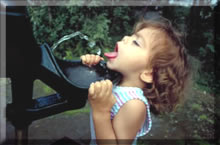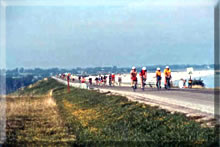 |
 |
||||||||||||||||||||||||||||||||||||||||||||||||||||
|
| |||||||||||||||||||||||||||||||||||||||||||||||||||||
 |
NWK: Rathbun Lake Watershed Alliance
Lake: Rathbun Lake, IA Partners: USACE; Land & Water Alliance; Rathbun Regional Water Association; Iowa Farm Bureau; Natural Resources Conservation Service; Renewable Energy/DOE Corps POC: William Duey, Operations Manager Story: Clean, fresh water for everyone and everything in the vicinity of Rathbun Lake, Iowa, is the goal of the Rathbun Land and Water Alliance. This 11,000-acre lake provides flood protection, fish and wildlife habitat, and recreation, and serves as the water supply for 50,000 customers of the Rathbun Regional Water Association (RRWA). The Alliance was started in 1996 by Soil and Water Conservation District Commissioners, Board of Supervisors, Iowa Farm Bureau, Chariton Valley Resource Conservation & Development, Natural Resources Conservation Service, RRWA, the Corps, and individuals representing agricultural and recreation interests. A Geographical Information System database is used to track conditions in the 365,000-acre watershed of the lake. Water chemical and nutrient analyses, resident water quality surveys, water quality education, and efforts to create rural businesses that rely on land use protection such as the Chariton Valley Biomass Project (growing switchgrass as an alternative fuel), Chariton Valley Beef Initiative (improving forage production for cattle), and the Chariton River Corridor Development Project (restoring habitat to increase tourism and recreation) are included in the partnership. What our partners are saying: "The U.S. Army Corps of Engineers support is a cornerstone of local efforts to enhance the natural resources and improve the quality of life in the Rathbun Lake region. Corps staff and programs provide assistance that helps local residents plan and carry out a wide range of projects from protecting water quality in Rathbun Lake and restoring fish and wildlife habitat to creating recreational facilities and promoting opportunities to increase tourism. Simply stated, the Corps plays an essential role in ensuring the well being of the Rathbun Lake region of southern Iowa." Martin Braster, Environmental Management Specialist with Rathbun Regional Water Association in Centerville, Iowa. |
|
||||
|
| ||||||

